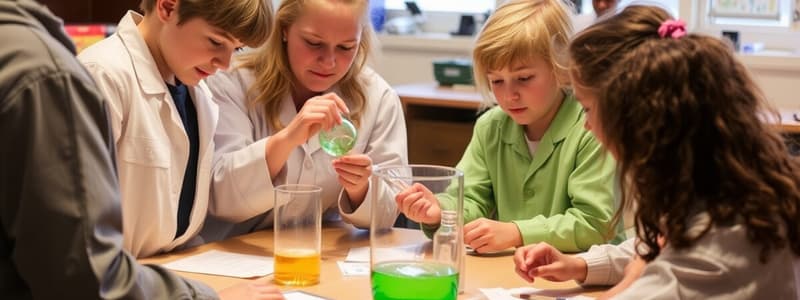Podcast
Questions and Answers
What is the process of presenting ideas or information in varied modes called?
What is the process of presenting ideas or information in varied modes called?
Communicating
Which of the following best describes the skill of classifying?
Which of the following best describes the skill of classifying?
- Manipulating factors in an investigation.
- Identifying similarities and differences between objects. (correct)
- Making a general statement that explains a matter.
- Presenting information in various forms.
What does controlling variables involve?
What does controlling variables involve?
Identifying factors that can affect an experimental outcome.
What is hypothesizing?
What is hypothesizing?
Which unit of measurement is part of the CGS system for length?
Which unit of measurement is part of the CGS system for length?
The International System of Units includes the unit 'pound' for mass.
The International System of Units includes the unit 'pound' for mass.
What is the process of conjecturing a coming event based on observation called?
What is the process of conjecturing a coming event based on observation called?
The skill of using all or some senses to gather information about an object is called ______.
The skill of using all or some senses to gather information about an object is called ______.
Quantitative observation involves information gathered using words.
Quantitative observation involves information gathered using words.
Match the following systems of units with their examples:
Match the following systems of units with their examples:
Flashcards
Communicating (in science)
Communicating (in science)
Presenting ideas using words, symbols, and visuals to describe objects or events.
Classifying
Classifying
Grouping objects or phenomena by shared characteristics.
Controlling Variables
Controlling Variables
Keeping some factors the same in an experiment while changing others.
Defining Operationally
Defining Operationally
Signup and view all the flashcards
Physical Quantity
Physical Quantity
Signup and view all the flashcards
Hypothesizing
Hypothesizing
Signup and view all the flashcards
Experimenting
Experimenting
Signup and view all the flashcards
Interpreting Data
Interpreting Data
Signup and view all the flashcards
SI Units
SI Units
Signup and view all the flashcards
Basic Science Process Skills
Basic Science Process Skills
Signup and view all the flashcards
Study Notes
Integrated Science Process Skills
- Communicating: Presenting ideas using various modes, including words and graphic symbols, to describe actions, objects, or events.
- Classifying: Identifying similarities and differences among objects or phenomena and organizing them into categories based on shared characteristics.
- Controlling Variables: Recognizing factors influencing experimental outcomes and maintaining them constant while manipulating others.
- Defining Operationally: Stating definitions of concepts or variables, including how they can be measured during an experiment.
- Hypothesizing: Formulating general statements that explain events and predicting expected outcomes of experiments.
- Experimenting: Conducting fair investigations to test hypotheses.
- Interpreting Data: Providing rational explanations for objects, events, or patterns derived from gathered information.
- Using Space-Time Relationship: Developing models to describe how parameters change over time in a process or event.
Physical Unit
- A known measure used to compare physical quantities of the same type, representing attributes or properties of the quantity.
Systems of Units
-
Human-based units: Measurement units derived from body dimensions, e.g., fathom, cubit, digit for length; picul for mass; nimesha for time.
-
English/British/Imperial system:
- Length includes mile, yard, foot, and inch.
- Mass includes pound, ounce, and stone.
- Time measured in seconds; temperature in degrees Fahrenheit.
-
CGS system:
- Length: centimeter.
- Mass: gram.
- Time: second.
-
MKS/MKSA/Metric system:
- Length: meter.
- Mass: kilogram.
- Time: second; electric current: ampere; temperature: degrees Celsius.
-
International System of Units (SI):
- Length: meter; mass: kilogram; time: second; electric current: ampere; thermodynamic temperature: kelvin; amount of substance: mole; luminous intensity: candela.
Predicting
- The process of forecasting future events based on observations, past experiences, or available data. Examples include predicting rain from dark clouds and anticipating a tsunami from receding seawater.
Science Process Skills
- Defined by the Science - A Process Approach (SAPA) curriculum as broadly transferable skills necessary across various science disciplines, reflecting scientists' behaviors.
- Skills are classified into two types: basic and integrated.
Basic Science Process Skills
-
Observing: Collecting information about objects or phenomena using senses.
- Qualitative Observation: Utilizing descriptive language (e.g., "The truck is heavy").
- Quantitative Observation: Employing numbers and measurements (e.g., "The man is 185 cm tall").
-
Inferring: Explaining observations by drawing on past experiences and previously gathered data.
-
Measuring: Describing dimensions of objects or events using both standard and nonstandard instruments, or estimations.
Physical Quantity
- An attribute or property of an object or system expressed as a measurable value, using instruments or senses for quantification.
Studying That Suits You
Use AI to generate personalized quizzes and flashcards to suit your learning preferences.




